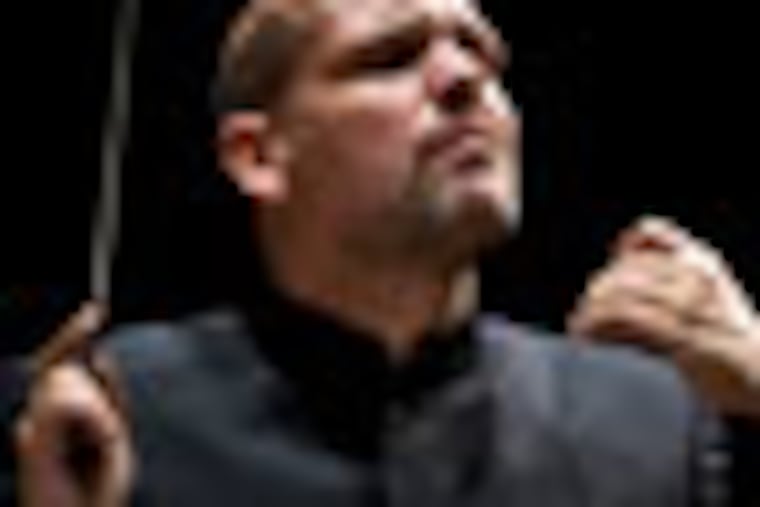Review: Argumentative van Zweden leads Philadelphia Orchestra
Mild-mannered he is not. If Jaap van Zweden were a dinner-party guest, he might dominate table chatter, slide headlong into controversy, and hold forth in a self-important if good-humored tone. As it was, leading the Philadelphia Orchestra in Friday night’s all-Russian program, the 51-year-old Dutchman was one of those guests trailing disagreement in his wake while still managing to leave you feeling more stimulated than riled.

Mild-mannered he is not. If Jaap van Zweden were a dinner-party guest, he might dominate table chatter, slide headlong into controversy, and hold forth in a self-important if good-humored tone.
As it was, leading the Philadelphia Orchestra in Friday night's all-Russian program, the 51-year-old Dutchman was one of those guests trailing disagreement in his wake while still managing to leave you feeling more stimulated than riled.
His most questionable piece of judgment on the podium in Verizon Hall was the sprint through the last movement of Tchaikovsky's Symphony No. 4. The pace was simply ridiculous. A strung-together series of blurs does not a legitimate artistic statement make. Elsewhere, however, his interpretive sympathies revealed a lively artistic soul with a fine ear for ensemble.
Music director of the Dallas Symphony Orchestra since 2008, van Zweden started, at age 19, as concertmaster of the Royal Concertgebouw Orchestra. Do such credentials give him any special insight or authority in shaping strings? Simon Rattle was a percussionist, Riccardo Muti a pianist; a conductor's instrumental rearing makes for a weak correlation to string savvy on the podium.
Van Zweden, though, reached a rarefied sonic stratum in Rudolf Barshai's 1960 string-orchestra arrangement of Shostakovich's String Quartet No. 8, redubbed the Opus 110a Chamber Symphony. The piece is actually two generations of repurposing, as Shostakovich wrought his string quartet from previous thematic material (the Symphony No. 5 and Cello Concerto No. 1, among many other works).
That Philadelphia's string philosophy coalesced beautifully won't be news to anyone, but van Zweden took certain notes one step deeper on the intensity scale, drawing that cascade of complex overtones that seems to build upon itself.
The conductor sees Hitchcockian terror in this score, which, along with somber but burnished solos from first associate concertmaster Juliette Kang and a stark absence of vibrato in places, made for the kind of music you'd expect to attend an anxiety attack on a dark winter afternoon. Shostakovich had a much wider swath of suffering in mind during its composition: The work, written in bomb-devastated Dresden, is dedicated to victims of war and fascism.
An alternately crisp and brooding Rimsky-Korsakov Russian Easter Overture offered no controversy. And though van Zweden's Tchaikovsky 4 could be fussy, it was also a chance to reconsider settled law.
Yes, the last movement was so brisk it drained away the pleasure of certain details. But what long and lovely phrases in the first movement — here, the opinions were no less emphatic, but every idea was couched in luxurious legato, rising in volume slowly over many bars.
Van Zweden could be heard on the radio not too long ago leading the Chicago Symphony Orchestra in a Brahms Violin Concerto that unearthed truths. Parts of van Zweden's Tchaikovsky were similar, arguing that, on balance, an unlikely mind is a good thing to have around.
No additional performances.
Contact Peter Dobrin at 215-854-5611 or pdobrin@phillynews.com. Read his blog at www.philly.com/artswatch.